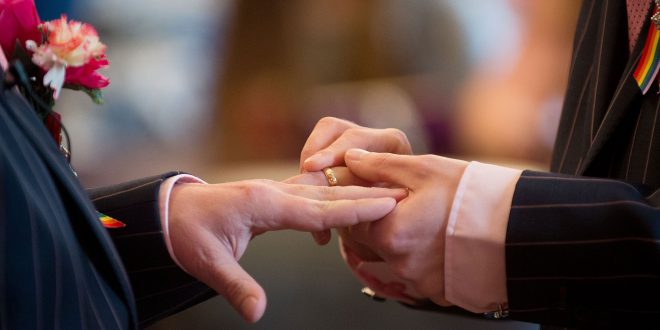Gay marriages, often also referred to as same-sex marriages, have been a contentious issue all over the world, especially in countries, where both the debate and debaters are to interact at a very public forum. Over the years, many arguments have been put forward in support of and against the legalization of gay marriages, each based upon by a volley of opinions coming from different schools of thought.
When examining the nature of debate over the question of legality regarding gay marriages, there are three main generic divisions within which the arguments regulate – biological, social and religious. If we consider the biological debate, the arguments from each side are not unexpectedly novel or unique. Those opposed to gay marriage argue that homosexuality is against the natural norms of procreation. The male and female species are anatomically designed to interact physically in harmony to lead to the creation of human off-springs. In that sense, the sexual interaction between the same sexes is against the laws of nature, and thus unacceptable in the social context of a healthy living community. On the other hand, gay activists propose that for those people who do not consider the lack of ability to procreate a set-back in any way, a homosexual relationship and its legal acceptance should not be an issue. While there are multiple sub-clauses to these arguments as well, the gist of the divergence lies in the question of procreation.
The social and religious facets of this debate concerning same-sex marriages are largely so interlinked. People of the Catholic religious tradition belief that homosexuality is against the tenets of the Bible. Thus, those involved in gay relationships are in complete violation of the Christian religious ideology.
l. Therefore, homosexuality and its legal sanction is not in any way a rejection or violation of any religious sensibilities. Either way, since there is no way in which to come upon an interpretation of the Bible that shall be acceptable to both the anti-gay and pro-gay sects of the agenda, it is hard to reach any nature of conclusion on this aspect of debate.
The social aspect of the debate on homosexuality is somewhat linked with both the biological and religious debate. Those who are not in favor of legalizing of gay marriage argue that since homosexuality is ‘unnatural’ and ‘a desecration of Christian Dictates’, legalizing same-sex unions shall lead to the spread of this socio-sexual anomaly in society. Providing legal sanction to same-sex marriages shall cause more and more people to believe that homosexuality is not a deviation from what is healthy and desirable, thus leading to the degradation of society. Those in support of the legalizing gay marriage argue that sexual orientation may be either an inherent preference or a personal life-style choice. Either way, any free individual should be at liberty to indulge in a relationship of homosexual nature, just as people can free have heterosexual relationships. Since gay people are not in any way less human than heterosexuals, and nor do their relationships have lesser or more sanctity than those of the latter, there is no reason why their marital union should not be illegal.
While there is no end to the debate on homosexuality and its legal sanction. While the judicial response has been varied in different regions, there is a general trend of homosexuality gaining more acceptances over the past decade.
1. In 2001, the Netherlands became the first country to legalize same-sex marriages.
2. Belgium followed suit in 2003 and granted equal rights to same-sex married couples.
3. Canada, In 2005, the Canadian Parliament passed legislation making same-sex marriage legal nationwide.
4. Spain, Also in 2005, a closely divided Spanish parliament agreed to do the same.
5. After South Africa‘s highest court ruled the country’s marriage laws violated the constitution’s guarantee of equal rights, parliament legalized same-sex marriage in 2006.
6. In 1993 Norway allowed gay couples to enter civil unions, but it took until 2008 for a Norway to pass a gender-neutral marriage law.
7. In 2009, Sweden voted overwhelmingly in favor of legalizing same-sex marriage.
8. Iceland‘s parliament voted unanimously to legalize same-sex marriage in 2010.
9. Portugal has also allowed same-sex marriage since 2010, after legislation was originally challenged by the country’s president.
10. In 2010, Argentina became the first Latin American country to allow same-sex marriage.
11. Denmark‘s legalization came in 2012 after Queen Margrethe II gave her royal assent to the proposed legislation.
12. Uruguay passed legislation allowing same-sex marriage in 2013.
13. In 2013, New Zealand became the first country in the Asia-Pacific to legislate for same-sex marriage.
14. President Francois Hollande signed a measure legalizing marriage equality in France in 2013.
15. Brazil’s National Council of Justice ruled that same-sex couples should not be denied marriage licenses in 2013, allowing same-sex marriages to begin across the country.
16. England and Wales became the first countries in the UK to pass marriage equality in 2014.
17. Scotland voted overwhelmingly in favor of of legalizing same-sex marriage later in 2014.
18. Luxembourg overwhelmingly approved legislation to allow gay and lesbian couples to wed and to adopt children that went into effect in 2015.
19. Finland approved a marriage equality bill in 2014.
20. Ireland became the first country to legalize same-sex marriage through a popular vote in 2015.
21. Greenland, the world’s biggest island, passed same-sex legislation in 2015.
22. The United States Supreme Court made marriage equality federal law in 2015.
23. Colombia became the fourth Latin American country to legalize same-sex marriage in 2016.
24. In 2017, Germany became the 15th European country to allow same-sex couples to wed.
25. In 2017, nearly all of Malta‘s parliament voted in favor of legalizing same-sex marriage.
26. Australia legalized same-sex marriage in 2017 after lawmakers enacted the will of the majority of citizens who overwhelmingly voted for the measure by postal vote.
27. Taiwan made history on May 24, 2019, becoming the first place in Asia to pass laws on marriage equality.
28. Ecuador‘s highest court approved same-sex marriage in a 5-4 ruling.
29. Costa Rica became the first Central American country to legalize same-sex marriage on May 26, 2020.
The column contains personal comments.
 Lesbian, Gay, Bisexual, Transgender & Intersex News Lesbian News, Gay News, Bisexual News, Transgender News, Intersex News, LGBTI News
Lesbian, Gay, Bisexual, Transgender & Intersex News Lesbian News, Gay News, Bisexual News, Transgender News, Intersex News, LGBTI News




